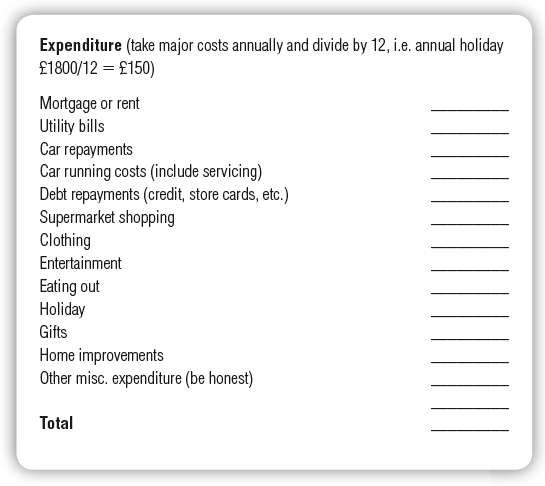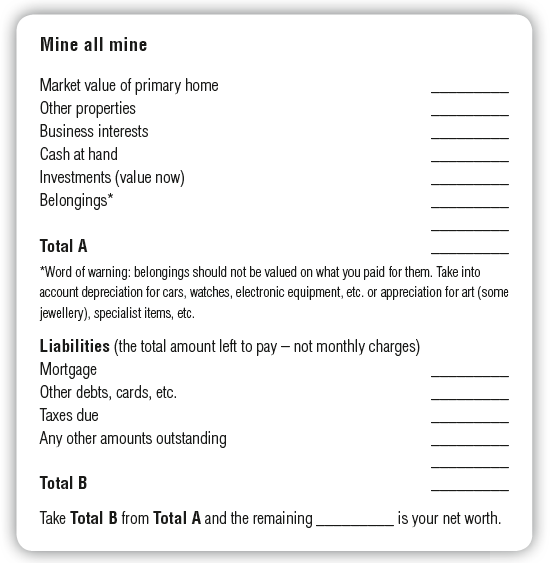MANAGEMENT
Being in control of your money rather than money having control of you is one of the fundamental principles of having a balanced Money Wheel.
Here are some questions for you. How much money do you have in the bank? How much do you owe? How much income do you need to support your life the way you live it right now? What is your net worth today?
If you know the answers to those questions then you are well on your way to being a brilliant money manager. If, like many, you ‘haven’t got a clue’ then here’s what you must do.
Complete a full and frank personal financial audit
Doesn’t that sound exciting? If you have a low mark for money management, you’re probably panic stricken at the thought or have a heavy heart at the prospect of doing something so incredibly dull.
So, how can I help to give you the motivation to do it? I could say that, if you don’t, the chances are your need for financial management and lack of awareness will cost you thousands, give you unnecessary stress then ultimately could even direct you into a downward spiral until you become a bankrupt.
Or I could just say the feeling you get when your finances are in order is right up there with receiving an unexpected tax rebate. Your choice, but it’s something that needs to be done.
So, let me take you by the hand and help you through the process.
The bank reconciliation
This is a vitally important place to start and, as most people have a bank account, it’s a brilliant way to check your current ‘cash’ position. This doesn’t mean notes and coins in your pocket; it’s about keeping a careful eye on your cash flow.
Here’s a simple way do it.
Take a start point. This may be your last bank statement. Then over a period of, say, one month record all cheques, standing orders and debit card slips. At the end of the month, take your bank statement and check off your card receipts, cheque stubs, known direct debits and standing orders against your statement.
Then take any uncashed cheques, uncleared debit transactions or amounts you know you have spent but have not yet cleared (not yet appeared on your bank statement) and take them from the total. Then add any money, cheques or amounts that have been deposited into your account since your last statement. The total is your true cash position. Note this is not your net worth – you’ll find that out in a minute.
This simple process does several things:
- It ensures you know the true amount in your account.
- It helps prevent fraud, double payments and mistakes.
- It raises your awareness of what you are spending.
- It gives you peace of mind that you have started to manage your money.
The monthly budget
For one month keep receipts for EVERYTHING you spend. If you can’t get a receipt, write it down straight away. Don’t think you’ll remember to do it at the end of the day; you won’t, so write it down as you spend and do it to the penny. You’ll use this amount in a moment and it’s very important that you don’t hide anything.


Now the moment of truth. Take your expenditure total from your income total and turn the remaining amount into a percentage of your income. How did you do?
- 25% plus: Well done! You are managing your money well.
- 10–25%: You are OK, but could be heading into the danger zone. This is mainly because it’s difficult to think of all your expenditure during an exercise like this. The closer you are to 10% the more of a challenge you have.
- 0–10%: The danger zone. This is because you are close to spending everything you earn and you probably aren’t aware of what you are buying. Do you find yourself saying things like ‘I just don’t know where the money goes’?
- Less than 0%: HELP! You must take massive immediate action now. You can’t hide your head in the sand any longer. It’s time to take drastic steps! Cut your costs and get out of that dangerous cycle. THIS IS A MUST – DO IT NOW!
What am I worth?
Have you ever taken the time to work out what you are worth? Here’s a simple formula.

Are you happy? If not, it may be time for you to focus on investing – see the previous chapter.
BRILL BIT
Once you have completed a bank reconciliation, monthly budget and understand your financial worth it doesn’t take long to maintain it each month. It’s brilliant to have big financial goals but you must first understand where you are starting from.
